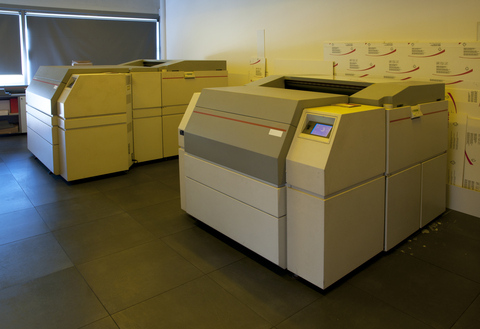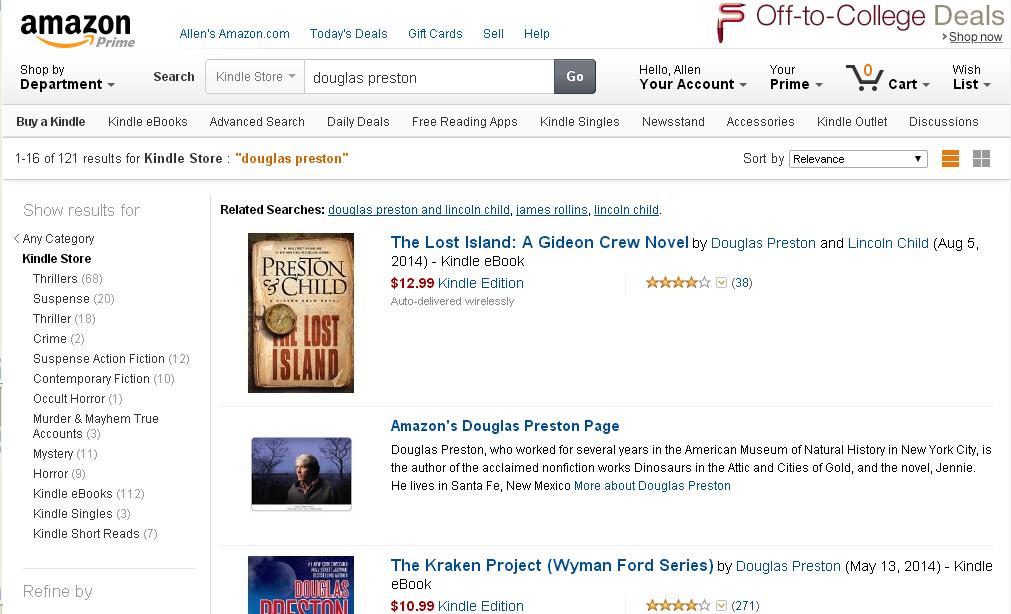Oh Amazon, Oh Hachette …
Oh, Lord!

4 E-book Formats Self-Published Authors Should Know About

Is Indie Publishing For Everyone?
Last Friday, I was sitting at home, minding my own business, not doing anything in particular other than enjoying a little quality one-on-one time with Mr. Johnson, when I was interrupted by an unexpected e-mail hurling into my inbox at the speed of Halley’s Comet.
It was from Amazon.
To be fair to Amazon, the e-mail actually arrived at 1:52 AM on Saturday. Trust me, wink, I strive for accuracy.
At any rate, it began thusly:
Dear KDP Author
KDP stands for Kindle Direct Publishing. It’s that nasty arm of the big Internet giant that allows independent authors like myself to put our works on Amazon’s website for selling, or ignoring, as the case might be. The salutation was a clue to me that Amazon wanted to tell me something. Something important. About my KDP account or status as a KDP author? Nope. Not even close. It was really about something that is none of my business. But it’s important, nonetheless. The letter continued:
Just ahead of World War II, there was a radical invention that shook the foundations of book publishing. It was the paperback book. This was a time when movie tickets cost 10 or 20 cents, and books cost $2.50. The new paperback cost 25 cents – it was ten times cheaper. Readers loved the paperback and millions of copies were sold in just the first year.
Say what?
It piqued my interest. History is really cool and fun to read. And I was impressed that Amazon knew I needed to brush up on my publishing history in order to better myself as an independent author. So I kept reading. The letter went on to say that George Orwell, of all people, publicly advocated that publishers, “if they had any sense,” should suppress those nasty little buggers called paperbacks. As others have pointed out, his quote was taken out of context. Poor Orwell.
Finally, after a little more meandering, Amazon got the point:
Fast forward to today, and it’s the e-book’s turn to be opposed by the literary establishment. Amazon and Hachette – a big US publisher and part of a $10 billion media conglomerate – are in the middle of a business dispute about e-books. We want lower e-book prices. Hachette does not. Many e-books are being released at $14.99 and even $19.99. That is unjustifiably high for an e-book. With an e-book, there’s no printing, no over-printing, no need to forecast, no returns, no lost sales due to out of stock, no warehousing costs, no transportation costs, and there is no secondary market – e-books cannot be resold as used books. E-books can and should be less expensive.
And I found myself agreeing. After all, I’ve been saying it for years. In fact, I have a personal policy not to purchase an e-book that costs more than $7.99, no matter how much I may want to read it. And I’ve all but given up buying paper books because, well, I’ve run out of room to put them. And my wife said she’d divorce me if I bought any more. But I digress.
Where did I get that $7.99 figure? Did I conduct a fancy-schmancy scientific study to determine it was the best, most optimal price for e-books? Nope. I pulled it out of my ass. Because that’s what we do in America. Anyhoo, Amazon wanted me on their side.
We will never give up our fight for reasonable e-book prices. We know making books more affordable is good for book culture. We’d like your help. Please email Hachette and copy us.
Whoa! Creepy. I’ve seen better calls to action in flashy mail order pieces for male enhancement products (don’t ask me why). They even included a few helpful talking points:
Please consider including these points: – We have noted your illegal collusion. Please stop working so hard to overcharge for ebooks. They can and should be less expensive. – Lowering e-book prices will help – not hurt – the reading culture, just like paperbacks did. – Stop using your authors as leverage and accept one of Amazon’s offers to take them out of the middle. – Especially if you’re an author yourself: Remind them that authors are not united on this issue.
Thanks. Thanks Amazon. Thanks for including me in a dispute that absolutely has nothing to do with me. And I’m not the only independent author put off by this. Chuck Wendig didn’t like it either.
Hachette’s Response
 Just as any self-respecting warmonger who received a shot across the bow would do, Hachette’s CEO Michael Pietsch issued a response. And like any self-respecting status quo supporter, he did it the old-fashioned way–through a friendly medium that wouldn’t actually question his motives. So what was his response? Care to take a guess? Come on, a little stab in the dark. Okay, you win. I’ll spill the beans:
Just as any self-respecting warmonger who received a shot across the bow would do, Hachette’s CEO Michael Pietsch issued a response. And like any self-respecting status quo supporter, he did it the old-fashioned way–through a friendly medium that wouldn’t actually question his motives. So what was his response? Care to take a guess? Come on, a little stab in the dark. Okay, you win. I’ll spill the beans:
Hachette sets prices for our books entirely on our own, not in collusion with anyone.
That’s a lie. But wait. There’s more:
We set our ebook prices far below corresponding print book prices, reflecting savings in manufacturing and shipping.
You mean like this David Baldacci e-book, which is priced at $14.99 while the trade paperback is $16.00? You call that “far below,” Hachette?
Nevermind that the hardcover is $28.00. E-books are more comparable to mass market paperbacks because they achieve the same purpose. The only people who purchase hardcover books are people with money to burn and who want to be first to read a new book. Like mass market paperbacks, e-books are intended to be less expensive versions of a book and that allow readers on budgets, like me, to get some enjoyment out of life without having to spring for a Mercedes.
At any rate, there are other examples of Hachette’s head up its ass.
In the case of “The Lost Island” by Douglas Preston and Lincoln Child, the mass market is $8.00 while the e-book is $12.99. The mass market and e-book of Scott Turow’s “Identical” are virtually the same price ($10.00/$9.99). “The Panther” by Nelson DeMille: $8.99 for the e-book; $10.00 for mass market. Sandra Brown’s “Deadline” is priced at $8.00 for the mass market and $12.99 for the e-book. And these are all on the publisher’s own website.
More than 80% of the ebooks we publish are priced at $9.99 or lower.
Yeah, big frickin’ deal, Hachette.
Those few priced higher—most at $11.99 and $12.99—are less than half the price of their print versions.
Hardcovers. Less than half the price of the hardcover versions. Can you say “hardcover,” Mr. Pietsch? I knew you could.
Those higher priced ebooks will have lower prices soon, when the paperback version is published.
So what you’re telling me is the price is too high now. And you’re going to rectify that by lowering the price to the same as, or slightly below, maybe even slightly above, the price of the mass market paperback version, still making the e-book price too fracking high? Thanks for spelling it out for us.
As a publisher, we work to bring a variety of great books to readers, in a variety of formats and prices. We know by experience that there is not one appropriate price for all ebooks, and that all ebooks do not belong in the same $9.99 box. Unlike retailers, publishers invest heavily in individual books, often for years, before we see any revenue. We invest in advances against royalties, editing, design, production, marketing, warehousing, shipping, piracy protection, and more. We recoup these costs from sales of all the versions of the book that we publish—hardcover, paperback, large print, audio, and ebook. While ebooks do not have the $2-$3 costs of manufacturing, warehousing, and shipping that print books have, their selling price carries a share of all our investments in the book.
Okay. There’s a lot here that could be addressed, but I’ll give Hachette the benefit of the doubt on this one. Of course they have an investment. That’s what they do. They invest in authors. They invest in books. That’s what their business is. Every book, every author, every title they agree to publish is an investment in future profits. That’s how publishing works.
But tell me this: Why is it that you can justify the price of your e-books when most of that investment was going to take place anyway?
Before e-books, you wouldn’t do anything any differently than you’re doing them now except for creating the e-book. Are you telling me that the cost of production for an e-book is so great that it justifies pricing it at the same price as a mass market paperback, which you were going to produce anyway and which, as you say, carries the extra investment of warehousing, shipping, and printing? E-books require no additional editing or design. All you have to do is take the initial manuscript and book cover–post-editing, post-design–and compile them into an e-book. I understand you need a team of professional e-book compilers to do this. So your added expenses might be salaries, benefits, and some overhead to cover equipment and office space. If it costs you the $2-$3 you spend on manufacturing, warehousing, and shipping your print books, then you’re doing it wrong.
And Then, The Authors Weighed In
Just lower your e-book prices, already. You could even take an extra 50 cents out of my pocket for each one you sell.
Enter the lowly author. Let’s name names:
- James Patterson (ever hear of him?)
- The aforementioned David Baldacci
- Pulitzer Prize-Winner Donna Tartt
- Lemony Snicket
- Scott Turow
- Douglas Preston
- Stephen King (who the hell is he?)
You know, best selling authors. Millionaire authors. Top dogs in the literary world. Yes, indeed, how the plot thickens.
Nevermind that any one of these authors could give Hachette the bird and go off on their own as independent author J.A. Konrath did and still be a best selling author.
As you might have guessed, all of these authors are owned by Hachette. And like good little slaves, they are coming to their master’s defense. By uniting against the big bully.
Funny. Hachette is more financially secure than Amazon and Amazon is the “bully.”
Nevermind that. Let’s get back to the real issue. Authors are getting their nuts kicked in by big bad Amazon, who has refused to sell pre-orders for Hachette’s books without actually ending all sales of those books in an attempt to draw Hachette back to the bargaining table so they can discuss their differences. What are those differences? E-book prices.
Amazon wants them lower. Hachette wants them higher.
That’s it on the face of it. Sure, Amazon may be plotting the takeover of the world. But Hachette already has it firmly in its hands. And Amazon’s the bad guy?
Alright, I understand that there are some Hachette authors who are not best selling authors who are also affected by this dispute. Some of them might not eat next week. Some may not be able to pay their rent because Amazon isn’t taking pre-orders for their books. I get that. But does anyone really believe this:
“We feel strongly that no bookseller should block the sale of books or otherwise prevent or discourage customers from ordering or receiving the books they want,”
which is what Preston’s letter to Amazon’s CEO Jeff Bezos said. The letter was also signed by 900+ other big name authors published by Hachette. Seriously, authors? You don’t believe a bookseller has a right to decide which books it sells and which it doesn’t? Amazon can’t run its own business?
I’m not surprised. These authors are all acting in their own self-interests. Their pocketbooks are hurting because Amazon isn’t taking pre-orders.
But why aren’t they writing to Hachette, their own publisher, and asking them to meet Amazon somewhere in the middle?
Just lower your e-book prices, already. You could even take an extra 50 cents out of my pocket for each one you sell?
Nope. Not a single word about e-book prices from any of the best selling authors who want Amazon to quit using them as leverage.
This entire drama has reached an epically absurd level of insanity.
Of course, I’m not defending Amazon’s choice in taking away the pre-order button from Hachette’s authors’ books (I’m not criticizing it either, did you notice?). But I will say that of all the players in this grand drama, Amazon is the only one who is truly taking up the cause of the true victim in this scenario–not the people that Hachette and Douglas Preston would have you think are the victims. The true victims are readers.
Yes, readers. E-book readers and print book readers.
Why? Because the bottom line is, no matter what the cost of e-books is or ever will be, no matter what the cost of production is, those costs will inevitably be passed on to readers. Whatever the price e-books are, that’s the price that readers will pay–if they want e-books. Hachette, and other traditional publishers, want high e-book prices because they’d rather sell you a print book. This war is really a war between old media and new media. If new media wins, e-book prices will go lower. If old media wins, e-book prices will rise. Is there a consumer, a reader, anywhere in the world who wouldn’t opt for lower prices if given the choice? If so, I want to meet them.
This battle could be over who will dominate publishing. It could be about who will profit the most from the sale of e-books. It could be about the cost of production. It could be about any of those things. But it most definitely is also, and primarily, about e-book prices. Don’t forget that.
I wish Amazon hadn’t sent me that e-mail. I wish Douglas Preston hadn’t sent his letter to Amazon. And I wish Hachette’s CEO hadn’t gone to Digital Book World to make its appeal. Furthermore, I wish James Patterson and gang hadn’t taken out a full-page ad in the New York Times. All of these parties are fighting this war in the wrong way. Ultimately, it’s what readers are willing to pay for e-books. And even if you don’t read e-books, you are still affected by this war. All of us are. Because e-book prices also affect print book prices. And none of us can escape that reality.
You’re a consumer, right? Vote with your pocketbook. Do you want cheaper books? Buy cheaper books. Publishers will get the point. Or maybe not. But …
In a world gone mad, when big corporations fight big corporations in the name of raw self-interest and best selling authors cry like babies over spilled royalties, what’s a little guy with a Kindle Fire to do? Chill out and have a cold beer while I work on my own small tales. That’s what I suggest you do, too.


